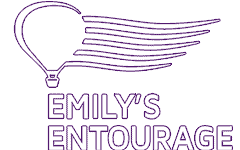9 leçons de médecine de Stanford qui changent la vie X
A couple weeks ago, I had the privilege of speaking at Stanford Medicine X and serving 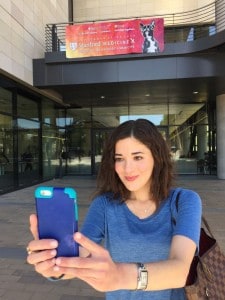 as an ePatient advisor to a new class of ePatients, individuals who are empowered and actively engaged in thir health and care.
as an ePatient advisor to a new class of ePatients, individuals who are empowered and actively engaged in thir health and care.
I have to be honest. I’ve been struggling to compose a recap. I’ve written countless blog posts only to select all and delete. I’m struggling because Medicine X is such an all-encompassing, full-sensory, life-changing experience that words feel insufficient. To call “Medicine X” just a “conference” falls short.
Medicine X is a movement
What sets Medicine X apart is much more than its flashy stage set, fancy video production equipment and open  access live streaming. It even goes beyond trending hot topics like design thinking and 3D printing—though all of those are pretty cool in their own right.
access live streaming. It even goes beyond trending hot topics like design thinking and 3D printing—though all of those are pretty cool in their own right.
At the end of the day, what separates Medicine X from the pack is that it’s an academic conference (very) deliberately designed for tout le monde. That’s not a catchy tagline or mere lip service. The folks at Medicine X really mean it.

Whether you’re a clinician, researcher, policymaker, technologist, patient, hospital administrator, family member, the list goes on—you belong, your voice is important and your story matters.
At its core, Medicine X is about stories.
There is power in stories, but too often they get stymied and too many important ones are left out—just under the surface, relegated to the periphery, itching to be exposed. Society suffers the consequence of silence.
Medicine X believes in unearthing precisely these stories. It pulls from the margins to reveal often-untold perspectives from unlikely storytellers. It asks tough questions, challenges long-held assumptions, and sheds light on the too oft-silenced experiences of those touched by medicine and health care.
And it does all of that on the main stage of the plenary hall. Under the blaring spotlight. Before a packed audience of eager listeners and learners.
From scorned and silenced to center stage—that’s the essence of Medicine X.
To recap Medicine X has proven impossible, so instead I’m sharing some of the wisdom I was so honored to gain. These are the zingers that hit my soul—all for different reasons—but the lessons that I now carry in my heart forever.
1. It’s all about relationships. Boy is that the truth—at Medicine X, in health care, and in life.

2. There is beauty and richness in the in-between. Conventional dichotomies are easy but insufficient. From Charlie revealing the limitations of gender categories to Ben showing the ridiculousness of classifying deafness as a communication disorder and Christine rejecting her hospital’s recommendation to avoid a family after a patient’s negative outcome—these brave souls blew my mind with their courage, conviction, and honesty, and they opened my eyes to the beauty of shades of gray.
3. Adversity can spawn secret superpowers. That’s not to say that adversity is a blessing; it is not. But in the face of adversity, new, special strength and skill can emerge.
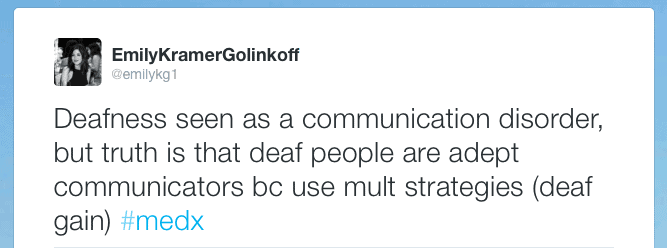
Ben referred to it as deaf gain, but I would venture to guess that many of us have a secret superpower lurking within. I think we need to start talking about how we can unleash the secret superpower within us all, the adversity gain if you will.
4. Essentialness of community. Illness is isolating, terrifying and tough. You simply cannot do it on your own. I experience the essentialness of community every single day through the Entourage that lifts me up and propels me forward and the CF community that is my lifeline.
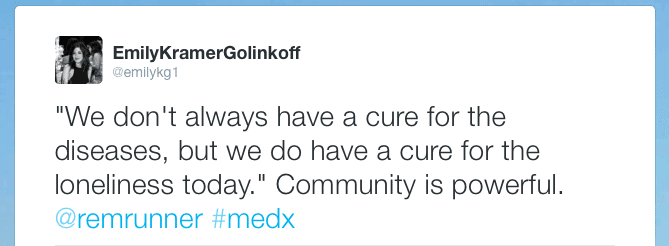
What I think the medical community sometimes fails to see is that community isn’t a warm and fuzzy add-on to a treatment plan; it’s an essential ingredient for physical, psychological and spiritual survival. Health care teams have a responsibility to know and share community resources with patients.
5. Patients with serious illness are uniquely capable disruptors. Urgency and laser focus are our secret superpowers. We need to design ways for health care to harness these special assets and let us help.
6. Humility is at the center of human-centered health and care. It’s about realizing how little each one of us knows, being eager and grateful for the opportunity to learn from each other, and letting our hearts lead the way.
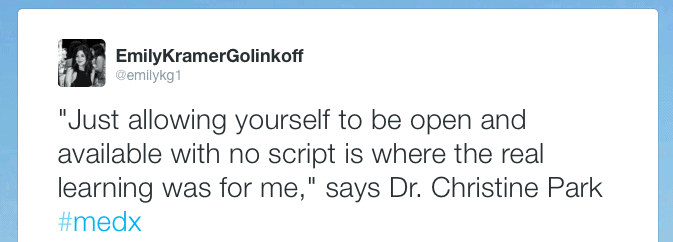
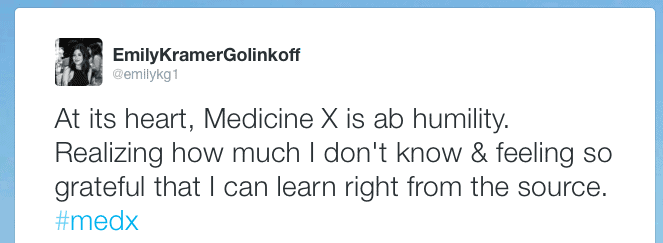
7. The story will always be incomplete until we let patients co-author their medical records. An initiative called Opennotes is leading the way by granting patients access to author and edit medical records, letting patients and clinicians write the story together. This has to become the norm, not the cutting edge.
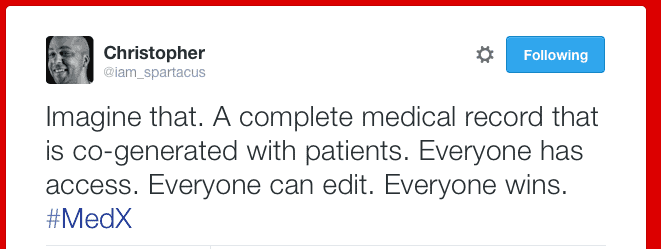
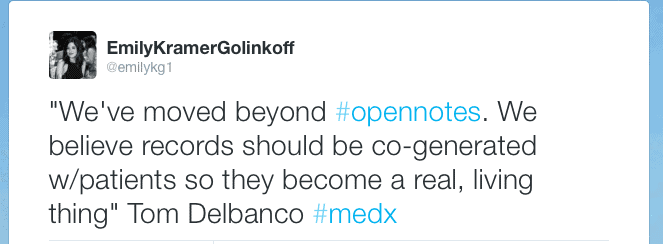
8. Patients are underrated. Conversations about the future of medicine often end up focusing on concerns about patient risks. Will they be able to make sense of their data? Will they make smart decisions about privacy or when to pursue treatment or how to manage their disease? Can they handle all the responsibility? Too often, these conversations are couched in an insidious paternalism that is demeaning and devaluing. We must push back. We, patients, can understand complexity; we can handle tough situations; we can make hard, informed decisions. Patients are capable. Don’t write us off.

9. Change is possible and it’s happening before our eyes. Sometimes health care can feel indomitable, but Tessa Richards’s talk on The BMJ’s patient partnership strategy gave me hope that the tides are changing. With this program, The BMJ is promoting co-production of health care—with, by, and for patients—by implementing a series of sweeping internal changes, including having patients co-author educational articles and serve as a standard part of the peer review process.
To have such a prestigious international journal take such a strong stance is an enormous win for the ePatient movement and glimmer of real, tangible hope for health care at large. Talk about being the change you want to see in the world—these folks are truly walking the walk and my goodness is it a breath of fresh air.
*****
So now, hopefully you can see why this blog post has been such a beast to write. There’s a reason they’ve had to coin the hashtag #MedXHangover to describe the post-conference period. Collective passion is intoxicating. The aftermath can be a bit tough, but now it’s our job to go forth and share the riches, to intoxicate the world with the awfully delicious kool-aid we’ve had the privilege to taste.
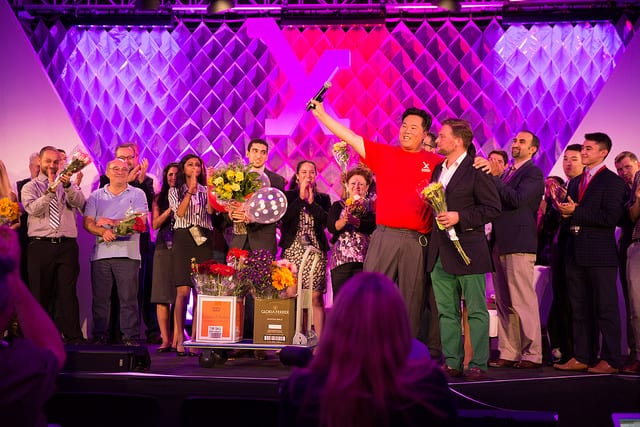
PS – Stay tuned for a video of my ignite talk coming soon!
***These thoughts are NOT original. They’re learned, shared, surmised, all from others, and that’s kind of the whole point. I give credit where I can, but please know that I count none of this as my own.
